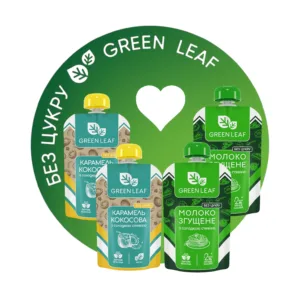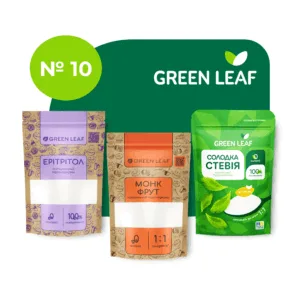

Ingredients:
natural sweetener – allulose
Storage conditions:
At temperatures from 0 ° C to + 25 ° C and relative humidity, not more than 75%.
24 months from the date of manufacture indicated on the package.
Nutrition Facts:
| Energy value | 167 kJ 40 kcal |
| Total Fat | 0,0 g |
| Saturated Fat | 0,0 g |
| Total Carbohydrate | 99 g |
| Sugars | 0,0 g |
| Protein | 0,0 g |
| Sodium | 0,0 g |
Price: 462,00 UAH
FREE DELIVERY from UAH 700
to the Nova Poshta post office
Allulose (D-allulose) is a rare natural sugar found in fruits such as figs, raisins and kiwi. It tastes almost the same as regular sugar, but has completely different properties.
The sweetness coefficient of allulose relative to sugar is 0.6 – 0.7. Therefore, to replace 100g of sugar, 120-140g of allulose is required.
Calorie content: almost zero
• Only 0.4 kcal per 1 g (for comparison: sugar – 4 kcal/g)
• Not absorbed by the body, excreted naturally
• Does not cause insulin spikes
• Suitable for diabetics, keto diets, low-carb diets
Does not increase blood sugar levels
Allulose has a zero glycemic index. This makes it safe for people with diabetes or insulin resistance.
Helps reduce body fat
Studies show that regular consumption of allulose can reduce the percentage of visceral fat.
Antioxidant effect
Helps reduce inflammation and oxidative stress.
Does not harm teeth
Does not cause cavities, unlike regular sugar.
Well tolerated by the gastrointestinal tract
Unlike many sugar substitutes, allulose does not cause bloating or abdominal discomfort in most people (in moderate doses).
Allulose in confectionery
Allulose stands out among sweeteners such as erythritol and stevia due to its unique properties. Unlike erythritol and stevia, allulose shows similarities to regular sugar, which makes it particularly interesting for making desserts. One of the notable differences is the ability of allulose to caramelize, which opens up new horizons for its use in caramel production. This process provides allulose-based confectionery products not only with a pleasant taste, but also with a characteristic caramel texture.



You may also like…
-
Set No. 9 Condensed milk 2 pcs.*90g + Coconut caramel 2 pcs.*90g GREEN LEAFPrice:Buy
300,00 UAHOriginal price was: 300,00 UAH.261,00 UAHCurrent price is: 261,00 UAH.Set №10 Erythritol 300g + Stevia (1:1) 250g + Monk Fruit 250g GREEN LEAFPrice:Coming soon504,00 UAHOriginal price was: 504,00 UAH.429,00 UAHCurrent price is: 429,00 UAH.Set No.12 Baking Mix Brownie 300g + Hot Chocolate 200g + Green Leaf Chocolate Topping 90gPrice:Buy438,00 UAHOriginal price was: 438,00 UAH.396,00 UAHCurrent price is: 396,00 UAH.
RECEIVING AND PROCESSING ORDERS:

- For goods from the section “Consumers”. Orders placed on Mon. – Fri. before 4:00 pm are processed and sent on the same day. Orders placed on Mon. – Fri. after 4:00 pm are processed and sent on the next day. Orders placed on Friday after 4:00 pm or Sat. – Sun. processed and shipped on Monday.
- For goods from the section “Manufacturers”. Orders placed on Mon. – Fri. before 4:00 pm are processed on the same day. Orders placed after 4:00 pm or Sat. – Sun. processed the next business day. Orders are dispatched within 3 working days. After receiving the order, the online store manager will contact you and inform you of the exact delivery date.
SHIPPING METHODS:

- Post office of “Nova Poshta”. Delivery throughout Ukraine, where there is an NP branch. For goods from the section “Consumers”, the cost of delivery is calculated according to the tariffs of Nova Poshta. For orders more than 700 UAH delivery to the branch of the company “Nova Poshta” is free.
- Express delivery of «Nova Poshta». The cost of delivery is calculated according to the tariffs of «Nova Poshta». For orders more than 1200 UAH delivery is free.
PAYMENT METHODS:

- Payment by Visa, Mastercard.
- COD in the branch of the company «Nova Poshta» (card or cash).
Orders up to 200 UAH are sent only after full prepayment. - Payment by bank details. The online store manager will draw up and send you an invoice for payment.





